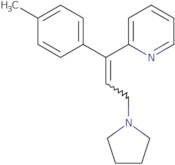
Product Information
- 2-[(1E)-1-(4-Methylphenyl)-3-(1-pyrrolidinyl)-1-propen-1-yl]pyridine
- Pyridine, 2-[(1E)-1-(4-methylphenyl)-3-(1-pyrrolidinyl)-1-propen-1-yl]-
- Pyridine, 2-[1-(4-methylphenyl)-3-(1-pyrrolidinyl)-1-propenyl]-, (E)-
- Pyridine, 2-[3-(1-pyrrolidinyl)-1-p-tolylpropenyl]-, (E)-
- Trans-1-(4'-methylphenyl)-1-(2''-pyridyl)-3-pyrrolidino-1-propene
- Tripolidina
- Triprolidin
- Triprolidine
- Tripyrolidine
- trans-1-(2-Pyridyl)-3-pyrrolidino-1-p-tolylprop-1-ene
- See more synonyms
- trans-1-(4-Methylphenyl)-1-(2-pyridyl)-3-pyrrolidinoprop-1-ene
- trans-2-[3-(1-Pyrrolidinyl)-1-p-tolypropenyl]pyridine
- 2-[(1Z)-1-(4-methylphenyl)-3-(pyrrolidin-1-yl)prop-1-en-1-yl]pyridine
- Pyridine, 2-[(1E)-1-(4-methylphenyl)-3-(1-pyrrolidinyl)-1-propenyl]-
- (E)-1-(2-pyridyl)-3-pyrrolidin-1-yl-1-p-tolylpropene
- 2-[(1E)-1-(4-methylphenyl)-3-pyrrolidin-1-ylprop-1-en-1-yl]pyridine hydrochloride
Actidil is a drug that inhibits histamine release from mast cells and basophils, which are cells responsible for allergic reactions. Actidil prevents the release of inflammatory mediators, such as histamine, leukotrienes, and prostaglandins. Actidil has been shown to inhibit polymerase chain reaction (PCR) in experimental models. This drug is used mainly to treat bowel diseases, such as ulcerative colitis and Crohn’s disease. It can also be used for the treatment of liver lesions caused by cytostatic drugs. Actidil has been tested in humans with other diseases as well, including asthma and rhinitis. The most common side effects are headache, dizziness, drowsiness, dry mouth or throat, constipation or diarrhea, nausea or vomiting.
Chemical properties
Technical inquiry about: 3D-AAA48612 Actidil
If you want to request a quotation or place an order, please instead add the desired products to your cart and then request a quotation or order from the cart. It is faster, cheaper, and you will be able to benefit from the available discounts and other advantages.





